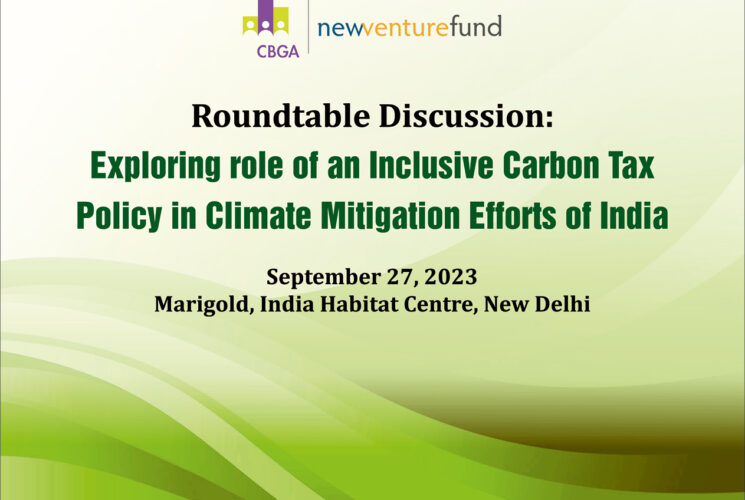Events
Roundtable on Exploring the Role of an Inclusive Carbon Tax Policy in Climate Mitigation Efforts of India 27 September, 2023
Centre for Budget and Governance Accountability (CBGA) organised a Roundtable titled "Exploring Role of an Inclusive Carbon Tax Policy in Climate Mitigation Efforts of India", at the India Habitat Centre, New Delhi on 27th of September 2023. The objective of the Roundtable was to develop an understanding of and facilitate the design of an appropriate and inclusive Carbon Tax Policy for India.
The discussion highlighted the multi-faceted nature of carbon tax, encompassing political, economic, and social aspects. Central to the discussions was the principle of inclusivity. It was underscored that any policy decision must encompass not only the vast swaths of the population but also nuances like sectoral considerations, the repercussions on various communities, and the equitable distribution of renewable energy. Participants grappled with the complexities inherent in crafting the carbon tax, especially its potentially regressive character, underscoring the urgency for a progressively designed solution. The discussions emphasized the importance of adopting a comprehensive perspective that goes beyond focusing solely on fossil fuels. Participants encouraged broader deliberations that consider the wider environmental implications.
The Finance Commission's significant role became apparent, particularly in addressing the challenges of distributing revenue among states with varying resource dependencies. Numerous uses for the carbon tax revenue were suggested, including supporting renewable energy and infrastructure, as well as funding essential social sectors. There was a strong emphasis on the importance of extensive research and inclusive policy discussions, highlighting the vital role of government officials in charting the way forward.
Key Takeaways-
-Tailored Approach: There is a need for a customized carbon tax framework that considers India's unique socio-political, economic, and historical complexities.
-Revenue Management: Participants expressed concerns about potential revenue misuse and recommended the establishment of a separate fund to ensure dedicated and appropriate utilization of carbon tax revenues.
-Equity and Inclusivity: Addressing the regressive nature of the tax and its potential impact on economically vulnerable sections while considering sector-specific adjustments was a central theme.
-Leveraging Existing Mechanisms: The value of building upon existing systems like the Perform, Achieve, and Trade (PAT) scheme for carbon tax implementation was recognized, despite potential integration challenges.
Key discussants from Centre for Policy Research, World Resource Institute, Berhampur University, Alliance for an Energy-Efficient Economy, OP Jindal University, Shakti Sustainable Energy Foundation, Shakti Sustainable Energy Foundation, Institute for Energy Economics and Financial Analysis, Association for Scientific And Academic Research and key personnel from CBGA took part in the roundtable discussion and provided valuable insights into the implementation of a carbon tax in India.
Past Events
- The Budget Dialogue: A Webinar on Union Budget 2024-25
- The Budget Dialogue: A Webinar on Interim Union Budget 2024-25
- Rajasthan Budget 2024-25: Workshop on Budget Priorities
- Roundtable on Understanding Carbon Pricing Policy in the Context of Maharashtra
- Roundtable on Instituting a Carbon Pricing Policy for India: Way Forward
- Roundtable on Exploring the Role of an Inclusive Carbon Tax Policy in Climate Mitigation Efforts of India
- The Budget Dialogue: A Webinar on Union Budget 2023-24
- Roundtables on Building an Inclusive and Cohesive Public Climate Financing Framework in Jharkhand and Rajasthan
- Roundtables on understanding the landscape of efforts in climate change mitigation financing for Green Economic Recovery of Odisha and Bihar
- Release of Study on Cost of Universalising Early Childhood Education (ECE) in India


